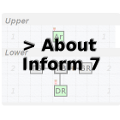Inform 7 Notes — 29 of 35
Bart Massey
Chapter - Lecture
This is the lecture outline rule: let status be the current board state of the whiteboard; if status is outlined, instead say "Prof Doppelgänger says 'You might want to review the outline on the board.'"; stand the professor; say "He says '[one of]Hmm... Here's[or]Like I said before, here's[stopping] what I'd talk about.' He walks to the whiteboard.[run paragraph on]"; make the professor write "Things to think about
* Ontologies
* Upper ontologies
* Relation and action descriptions
* Declarative representations"; now the current board state of the whiteboard is outlined.
To lecture saying (lecture text - a text): unless the current board state of the whiteboard is outlined, abide by the lecture outline rule; say "(Prof Doppelgänger starts to lecture.)[bold type][paragraph break][lecture text][roman type]".
This is the lecture about ontology rule: lecture saying "In computer science, an ontology is a declarative description of a system useful for reasoning about that system.
According to Tom Gruber 'An ontology is a specification of a conceptualization.' He notes that 'An ontology specifies a vocabulary with which to make assertions, which may be inputs or outputs of knowledge agents (such as a software program). As an interface specification, the ontology provides a language for communicating with the agent. An agent supporting this interface is not required to use the terms of the ontology as an internal encoding of its knowledge. Nonetheless, the definitions and formal constraints of the ontology do put restrictions on what can be meaningfully stated in this language.'"
This is the lecture about upper ontology rule: lecture saying "An upper ontology is generic rules used to build other ontologies. Inform 7 is either an upper ontology or an ontology for writing text adventures; it's kind of hard to tell.
One can easily imagine reimplementing or extending Inform 7 to work (well) outside the domain of text adventures."
This is the lecture about relations-actions rule: lecture saying "Early ontologies described systems like naïve physics in which action (system change) plays an important role. The recent trend is in the other direction: describing passive systems in terms of simple, often binary relations.
OWL/RDF and Protege are capable description languages, but they do not have any particular support for active systems. One can specify relations that imply actions (reification), but it's all kind of awkward and inexpressive.
Mark Heller says 'modeling time, or action, as would be found in describing the interrelationships between objects was difficult. For example, how a mob interacts with a room by walking or jumping up and down was something that felt unintuitive in the inheritance hierarchy.'"
This is the lecture about declarative rule: lecture saying "There's a fine line between a semantic description of action and a computer program (c.f. Nimrod). It is interesting to consider in what sense Inform 7 is declarative.
Arguably, Inform 7 is as declarative as Cyc's CycL. I7 is a much more expressive language than CycL. However, its encoding of procedural knowledge raises some important questions about the ontology enterprise."
